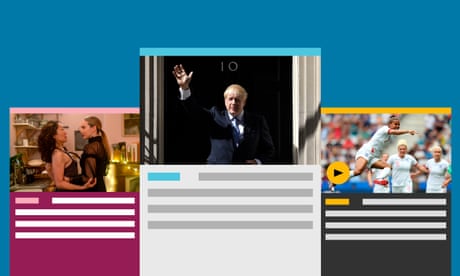UK housing boom leads to £2,500 jump in asking prices
‘Boris bounce’ invigorates buyers and sellers, leading to 12% surge in sales

Britain’s property market is in the grip of fresh boom, according to Rightmove, with asking prices jumping by more than £2,500 over the past month alone.
The average asking price for a home rose to £309,399 in February, £40 shy of its all-time record, said Rightmove. Buyers and sellers have been invigorated by renewed economic confidence, described as the “Boris bounce”, it added.
Rightmove, which is Britain’s biggest property portal, said it received a record 152m visits in January. Agreed sales surged by 12% compared with the same month last year.
In its most exuberant market report since the last boom in 2014-15, Rightmove predicted price records would be broken in the spring and hesitant buyers should “now jump in”.

Guardian Today: the headlines, the analysis, the debate – sent direct to you
Read more
Because Rightmove’s monthly figures are based on asking prices rather than sale prices, they are regarded by some critics as far less reliable than Land Registry data. But the figures are based on the 108,107 asking prices recorded on the site over the past month, equal to 95% of the UK market.
They align with recent reports from Halifax and Nationwide, based on mortgage data. Halifax said that in January Britain’s house price inflation rate surged to 4.1%, the highest since February 2018, while Nationwide said prices rose by 1.9% over the month.
Rightmove director, Miles Shipside, said: “There is a boom in buyer activity outstripping the rise in the number of new sellers, which we expect to lead to a series of new price records starting next month. Buyers who had been hesitating and waiting for the greater political certainty following the election outcome may be paying a higher price but they can now jump into the spring market with renewed confidence.”
Others said the “Boris bounce” could flag after the budget and if wrangling over EU trade negotiations saps confidence in the economy.
Lucian Cook, the head of Savills residential research, said: “Our own agents are reporting that the vast majority of buyers remain unwilling to increase their budgets. Accordingly, our advice remains that sellers need to remain pragmatic on price, particularly given some of the uncertainty around an impending budget, the first of the new government.”
Edward Heaton, a buying agent who acts for investors at the top end of the UK market, said: “I would expect any house price rises we’ve seen in January to flatten by the latter part of the year, as attention will inevitably turn to ‘deal or no deal’. Trade negotiations will unavoidably affect market confidence – both in attracting foreign investors and housebuilders who rely on European materials.”
Rightmove said prices rose in the month to mid-February in every part of the UK except the East Midlands. The highest regional monthly and annual increase was recorded in Yorkshire and Humberside, where asking prices were 5.1% higher than last year, according to the website.
London was the first area to experience a slowdown in the property market after 2016 and was hit hardest by Brexit. But some boroughs are seeing a return to strong price growth. Rightmove said prices in Camden jumped by 5.7% over the month, adding £50,000 to the average £1,023,489 price tag in the London borough, returning them to where they were a year ago.